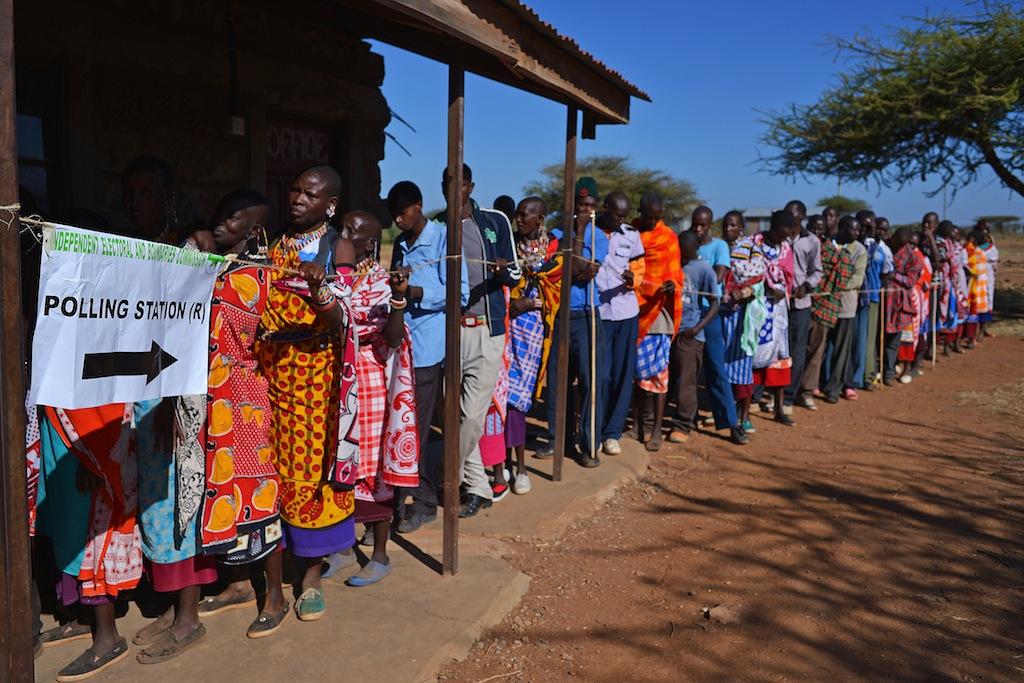Tanzania to evict Maasai people in favor of fee-paying trophy hunters
Maasai people queue to vote in Ilngarooj, Kajiado County, Maasailand, on March 4, 2013 during the nationwide elections.
NAIROBI, Kenya — Tens of thousands of Maasai people in northern Tanzania, under a new government plan, face eviction from their homes and a ban from the land their cattle have grazed for generations.
Tanzania says it will designate as a "wildlife corridor" a 600-square-mile patch of land next to the popular tourist attractions of the Serengeti National Park and Ngorongoro Conservation Area.
The designation bans pastoralist Maasai herders — known for their red tartan-print blankets and intricate beadwork — from the land, but permits fee-paying trophy hunters to access the area as guests of a United Arab Emirates company called Ortello Business Corporation (OBC), which has had a concession in the area for 21 years.
“The government it taking the land for this so-called wildlife corridor. The Maasai is being kicked off that land but the investor is left to enjoy,” said Samwel Nangira, an activist and resident of the affected area of Loliondo.
“The government is clearing the land, not for conservation but for commercial hunting,” he said.
International activists agree and say the plan could further impoverish Maasai communities to the extent that their traditional, semi-nomadic way of life becomes impossible to sustain.
“The proposed move will prevent the Maasai from accessing vital pastures and water in the area and risks causing destitution,” said Carl Soderbergh, director of policy and communications at Minority Rights Group International.
A letter signed by “The Maasai community of Ngorongoro District” was published by web-based advocacy organization Avaaz late last month calling for a global protest against the government initiative. Similar pressure applied last year forestalled the planned evictions, until now.
“The government has just announced that it plans to kick thousands of our families off our lands so that wealthy tourists can use them to shoot lions and leopards,” the letter reads.
According to the website AfricaHunting.com, “Tanzania has long been considered the ultimate hunting safari destination in Africa,” where elephant, lion, buffalo and cheetah can all be legally killed.
By Monday Avaaz’ online petition lobbying President Jakaya Kikwete to oppose the evictions had gained more than 1.7 million signatures.
The crux of the matter is in a disagreement over who owns the land.
Nangira insists that Maasai villagers have not only used the land for living and grazing their cattle “since before records began” but that they were granted title deeds inside the 1,500-square-mile Loliondo Game Controlled Area after being excluded from the Serengeti and Ngorongoro reserves.
Nangira says the government is now reneging on that promise, but the government disagrees.
“In this country, all land belongs to the president; it is only leased to the public,” Tourism and Natural Resources Minister Khamis Kagasheki said recently. “The 1,500-square-mile game-controlled area has never been transferred to Maasai communities.”
Kagasheki told the state-owned Tanzania Daily News that far from taking land from the Maasai, the government is giving land to them by permitting the use of all but the newly designated wildlife corridor.
Kagasheki insisted the only government land grabbing that had gone on was “from itself to benefit its citizens.”
But Nangira said this is disingenuous. “The minister is either misinformed or misleading the Maasai. The land is being taken from the Maasai to give to a corporate investor,” he said.
Jo Woodman, a campaigner at Survival International, says the new directive is in an inelegant solution to a “policy mess” whereby a law change in 2009 meant villages could no longer overlap with areas where commercial hunting is permitted. The government decision puts the commercial investment ahead of the needs of the Maasai.
Woodman said this threatened the very existence of the Maasai people.
“The Maasai have been squeezed by the privatization and compartmentalizing of the land, their ability to graze their animals has been curtailed by the parceling out of the land to private interests. They simply cannot afford to lose any more land,” he said.
“What the community needs is a sustainable, workable solution to this problem.”
But such an outcome is looking increasingly unlikely.
The last time Maasai were evicted, in 2009, it quickly turned violent. Homes were burned to the ground, people were beaten and arrested. With both government and Maasai refusing to back down Nangira said he feared that this time, it might be worse.
“This is our big worry, that people will be pushed, beaten or even killed,” he said.
Every day, reporters and producers at The World are hard at work bringing you human-centered news from across the globe. But we can’t do it without you. We need your support to ensure we can continue this work for another year.
Make a gift today, and you’ll help us unlock a matching gift of $67,000!
